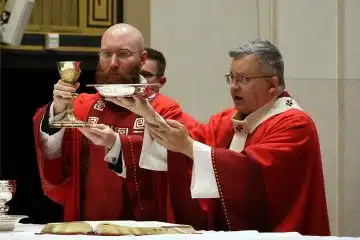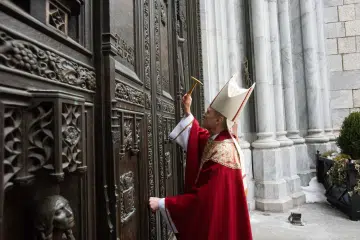Celebrating Christ’s presence as couples and families
June 1, 2012
By Bonnie Mack
“The family exists at the heart of all societies. It is the first and most basic community to which every person belongs. There is nothing more fundamental to our vitality as a society and as a Church. For, in the words of John Paul II, “The future of humanity passes by way of the family” (“On the Family,” no. 86).
The month of June conjures up thoughts of graduations, vacations and weddings. While other months have recently become more popular for weddings, there are still plenty of June brides.
Pre-Cana, the archdiocesan marriage preparation program continues to prepare engaged couples for the sacrament. In the orientation for the day, couples hear about God’s love of and emphasis on marriage. From the beginning of the Bible to the very end, marriage is elevated and revered. The first married couple, Adam and Eve, are introduced in the initial book of the Bible, Genesis, with the words we often hear recited at weddings “so for this reason a man shall leave his father and mother and cling to his wife” (Genesis 2:24). As Jesus begins His ministry, marriage is celebrated. He performs His first miracle at a wedding reception in the town of Cana changing water into wine (John 2:11).
Finally, marriage is the analogy God uses when He talks about Christ’s second coming in the Book of Revelation. Jesus first came into the world as suffering servant, but when He returns, He will come as the Lord of Lords and King of Kings, the Bridegroom for His beloved bride, the church (Revelation 19:7). God is definitely invested in marriage and couples are encouraged to invite Him into their marriage as the strong cord binding them together (Ecclesiastes 4:12).
“A family is our first community and the most basic way in which the Lord gathers us, forms us, and acts in the world. The early church expressed this truth by calling the Christian family a domestic church or church of the home.” (Follow the Way of Love, p.6).
At Pre-Cana, couples learn they begin forming family immediately upon marriage. While baptism brings all Christians into union with God, family relationships only confirm and deepen this union, signifying patterns of holiness. As we “live” the ordinary moments of life from mealtimes and household chores, caring for a sick child or an elderly parent, even conflicts over money, use of time or discipline of children, we are actually participating in the Lord’s work, in holiness. Too often we do not consider wiping a runny nose or balancing a budget with a spouse, holy; holiness is something that only happens at church. Too often families think they go to church to get holy instead of going to remember we are holy in our daily efforts to love one another.
When couples begin to learn and understand their relationship and family events are holy in themselves, they can recognize and celebrate Christ’s presence in the dynamics of the ordinary. The parallels between church and home need to be both recognized and realized before their significance deepens. We need not look any further than the simple meal around the table. When a couple eats an ordinary meal together, much more than stomachs are filled. We bring more than physical hunger to the table. The meal is an ordinary yet sacred opportunity to know one another in the breaking of the bread…to know intimacy with the Lord through intimacy with one another. In the sharing of ordinary food and conversation, the sacred is likely to emerge from one day to the next. Hearing about the other’s day and sharing a prayer together are just a couple of ways we build and strengthen personal and faith relationships which bind us together.
The family meal is a wonderful opportunity to demonstrate the parallel to our church “family meal” together. The tablecloth (or placemats) calls attention to the table around which we gather as family. We remember the people who sit or have sat at our family table on both daily and special occasions. While looking at the white altar cloth on the parish table, we are reminded how we as a church community or family come regularly and frequently to the table of the Lord.
Just as the family might light a candle holding special meaning, perhaps a baptismal candle, a birthday candle, a romantic or sentimental candle, anything used on special occasions, the altar is set with two candles. At Mass these candles are lit from the Pascal candle, symbol of the light of Christ. We are to be this light in the world.
As we think about the common basket of bread shared at a daily meal, we are reminded that in Communion we receive the bread of life. Similarly, as we look at the dinner table cups and glasses and think of the common drink for which we thirst, we can visualize the chalice next to the paten and be reminded that as we receive our Lord in the taking of the wine transformed into His blood, our spiritual thirst is quenched.
The prayers we say before a meal help remind us of God’s generosity and unite us as a family. Likewise, the Sacramentary contains the ritual common prayers of the church handed down through the years. These prayers of thanksgiving, petition and praise unite us with Catholics throughout the world and throughout history. Refrigerator photos and photo albums tell stories of special family times we continue to recount, just as the Lectionary contains stories of the faith community told and retold each time we come together for Mass.
Whether you’re just forming your family as newlyweds or have been sharing holy moments for more than 50 years, we encourage you to continue growing together with Christ and deepening your understanding of what it means to be holy people building your domestic church.
Mack is a marriage coordinator in the archdiocesan Family and Respect Life Office













